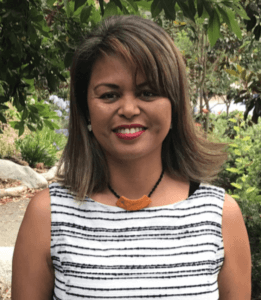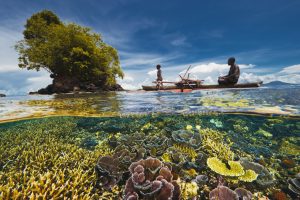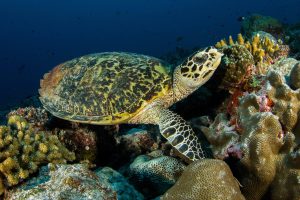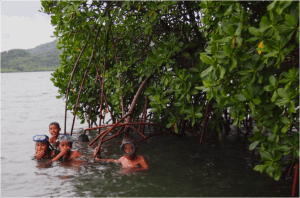 I joined OneReef primarily because their model for working with communities demonstrated direct and practical support truly driven by community objectives and needs for protection of their natural resources. It was about THEM by THEM…their objectives, their needs; they were true partners in the sense that they have an equal opportunity to design, plan, manage, implement, and even celebrate their achievements. Although it is inevitable for governments and larger organizations to have bottlenecks, I wanted to participate in a different approach. OneReef connects scientists and other important partners with communities. We are still challenged by how to communicate the science that has been collected. We need meaningful ways of communicating what’s happening in the ocean, and visual aids like films and documentaries are quite appealing. I am confident that collaboration with native communities – hearing their voices, perspectives, ideas, solutions – add value for identifying and implementing solutions.
I joined OneReef primarily because their model for working with communities demonstrated direct and practical support truly driven by community objectives and needs for protection of their natural resources. It was about THEM by THEM…their objectives, their needs; they were true partners in the sense that they have an equal opportunity to design, plan, manage, implement, and even celebrate their achievements. Although it is inevitable for governments and larger organizations to have bottlenecks, I wanted to participate in a different approach. OneReef connects scientists and other important partners with communities. We are still challenged by how to communicate the science that has been collected. We need meaningful ways of communicating what’s happening in the ocean, and visual aids like films and documentaries are quite appealing. I am confident that collaboration with native communities – hearing their voices, perspectives, ideas, solutions – add value for identifying and implementing solutions.
To preface my talk, I’d like to share that upon returning home to Palau after 15 years in the U.S., I was never interested or directly engaged in environmental conservation in the sense of actively working day-to-day towards protecting the environment. It was my hope and desire to contribute to the growth and well-being of my people and nation. In contrast to environmental conservation, I suppose you could say I’m interested in people conservation and cultural preservation. Both are fundamentally and unavoidably connected to the natural environment, and therefore inevitably and despite my efforts, impelled me into environmental conservation. As a trained social scientist, however, I quickly recognized that the handful of Palauan natural scientists, at the time of my return, weren’t necessarily interested in my contributions (if any). First of all, I posed way too many questions. One very simple and repetitive question I had was, “Are we protecting the fish for the fish or for the people?” It was also my duty to encourage my colleagues to consider gender and other socio-cultural factors as a critical aspect of thinking about and practicing conservation.
Consequently, as a Palauan woman in conservation today, I want to begin with an interesting revelation about Palauan women whose stories are often untold. A colleague once said to me, “You know what, Palauan women were essentially hydro-engineers!” He was referring to a scientific publication that was released in 2013 about how Palauan traditional taro cultivation systems indeed controlled sedimentation flow to the ocean. Part of taro cultivation requires regular maintenance and management of waterways surrounding taro fields. Palauan women routinely dig ditches to increase water flow or use organic material (tree trunks, branches) or plant various plants/trees to stop or slow water flow, depending on the condition of the taro farm. Traditionally, males and sometimes the whole community was solicited to help with excessive sediment buildup and overgrowth that had accumulated in the streams to help channel water flow around the farms and to the ocean. So, as I was processing this analogy between Palauan women and hydro-engineers, it actually made sense Palauan women were hydro-engineers! Funny thing is, this label never really resonated with me before. I think back at memories of both my grandmothers farming…it’s what their mothers’ mothers did before them, what they did all my years growing up, and now what I am trying to carry on. It was and is a part of the subsistence system lifestyle that Palauans depended on…it was a necessary part of day-to-day life.

This brings me to the point that responsible stewardship and eco-consciousness have been a central part of Palauan culture or our traditional way of life. It was rooted in the principles of respect and reciprocity…for the survival and sustainability of ALL. RESPECT…for all things…every plant, animal, person (even if you don’t like the person)…everything…it was/is equivalent to the Golden Rule. RECIPROCITY (give and take) from the Palauan perspective is applicable to humans as well as our relationship to the environment. It required comprehensive knowledge about ecological life cycles and ultimately ensured sustainability of natural resources for the future. Sustainability was the bottom-line in the past. Historically, Palauan Chiefs used bul or a traditional moratorium to ensure the preservation or perpetuation of our natural resources. It was customary to designate a specific area a “no-take” zone or outlaw the harvest of a specific species of a terrestrial or marine resource for a certain period of time. As a result, Palauans have had hundreds of years of eco-consciousness imbedded into their knowledge systems long before MPAs became a sexy concept in the modern conservation world. Although modernization has enabled Palauans to articulate much of our traditional conservation principles into English, discourse around these concepts lack the wisdom of the complex nuances that shape the profound sense of respect, honor, responsibility, piety, integrity, and humility deeply intertwined in our traditional eco-consciousness and cultural practices. Comparing traditional eco-conscious principles to modern conservation models is often inadequate due to the legalistic nature of contemporary systems. There was a supernatural or spiritual element deeply rooted in the Palauan ethos that recognized a higher being or mindfulness. While there were rules and guidelines that guided behavior, they were fixed on a collective system that believed that the survival and reputation of a clan and the village (community), as an extension of the clans, depended on a deep sense of duty, integrity and honor to one’s family and the wider community. Consequently, rewards and penalties for the established norms was felt collectively by all.
 If you’re not familiar with Palau, it is comprised of about 400-500 limestone rock islands, many uninhabitable, but others with sandy beach areas suitable for settlement. Ioulomekang, the rock island that my family settled on (more like camped at), is a southern rock island well known for turtle nesting. We spent a significant amount of time (living) there during my youth. Back then, it was customary for my grandmother (who is 93 years old today) to locate a turtle nest and dig out 3-4 turtle eggs, leaving the rest to mature. She explained that the eggs were so rich, one was enough for one person and anyway it was considered a delicacy (special occasions only). It didn’t sink in much back then, but in hindsight, I recognize that this was part of our practice of only taking what we needed and letting nature take its normal course to replenish itself. Unlike how we think about natural resources (especially fish as a commodity), our natural resources were personified and also revered as ancestors which made it easier to self-regulate consumption. Today, Palauans struggle with how to manage and especially enforce protected areas or protected natural resources. Just two weeks ago in a national dialogue, there was a move to revert to traditional methods of penalizing those who were non-compliant since the legal system on our islands could not prioritize these types of “crimes.” How do Palauans and other Indigenous people address this type of cognitive dissonance – How do we now negotiate, navigate and balance tradition with present global trends, technologies, and practices? For example, despite my father’s teachings and practices, there have been instances throughout my life where they conflicted with the realities of our changing world (culture and social dynamics). During my youth, my father was one of the first fishermen to sell reef fish outside of Palau.
If you’re not familiar with Palau, it is comprised of about 400-500 limestone rock islands, many uninhabitable, but others with sandy beach areas suitable for settlement. Ioulomekang, the rock island that my family settled on (more like camped at), is a southern rock island well known for turtle nesting. We spent a significant amount of time (living) there during my youth. Back then, it was customary for my grandmother (who is 93 years old today) to locate a turtle nest and dig out 3-4 turtle eggs, leaving the rest to mature. She explained that the eggs were so rich, one was enough for one person and anyway it was considered a delicacy (special occasions only). It didn’t sink in much back then, but in hindsight, I recognize that this was part of our practice of only taking what we needed and letting nature take its normal course to replenish itself. Unlike how we think about natural resources (especially fish as a commodity), our natural resources were personified and also revered as ancestors which made it easier to self-regulate consumption. Today, Palauans struggle with how to manage and especially enforce protected areas or protected natural resources. Just two weeks ago in a national dialogue, there was a move to revert to traditional methods of penalizing those who were non-compliant since the legal system on our islands could not prioritize these types of “crimes.” How do Palauans and other Indigenous people address this type of cognitive dissonance – How do we now negotiate, navigate and balance tradition with present global trends, technologies, and practices? For example, despite my father’s teachings and practices, there have been instances throughout my life where they conflicted with the realities of our changing world (culture and social dynamics). During my youth, my father was one of the first fishermen to sell reef fish outside of Palau.
I recall traveling back-and-forth between the island of Guam with coolers full of fish. I would usually arrive on a Friday night in time to sell fish on the side of the main stretch of road or at flea markets. I remember questioning him about this…we were supposed to only take what we needed to eat so why are we now filling up coolers to sell in Guam? His immediate response was because we needed the extra money. How and why did my father, a rather conservative and traditional Palauan fisherman, shift in his thinking and his ways so swiftly? This simple question can be similarly examined from various contexts where policies are established that otherwise contradict our traditional principles and practices.

Despite the ever present challenges of our existence today, Palauans, like many other Pacific Islanders continue to need and value global partners who recognize and appreciate our traditional connections to the ocean/environment, understand the complexities of our dependence on/stewardship of the ocean, and collaborate with us to effectively address the compound issues that we are faced with as planet. The ocean and the environment that we draw from are innately tied to our cultural identity, our survival as a people, and our connection to the global community. What does all of this mean for pacific islanders whose existence relies on the ocean? How have we observed and participated in this now global movement to protect the ocean? What role do we play in this massive initiative? As primary users and guardians, we hope to be perceived as experts, teachers, and partners, not victims, backward natives or ignorant bystanders. Despite our own limitations, the existence of Palauans and other pacific islanders today is evidence that we are resilient and our traditional knowledge and cultural practices have value and can support overall ocean conservation.